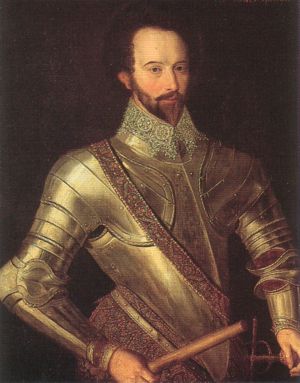Walter Raleigh
 From Conservapedia
From Conservapedia Sir Walter Raleigh (c1554-1618) English courtier, poet, soldier, and sometime privateer, and colonist. He was one of the Devon gentry like Francis Drake, Humphrey Gilbert, Richard Grenville and others who rose to prominence during the reign of Elizabeth I, and harried Spain so mercilessly, both before and after the Armada of 1588.
As a teenager he joined the Huguenot (Protestant) cause in France where he fought for six years. In 1578 he joined Gilbert in an expedition against the Spaniards and was lucky to return with his life. 1580-81 found him soldiering in Ireland. Thereafter he rose swiftly in favour and patronage, and was knighted in 1584. He became captain of the Queen's guard and lord-lieutenant of Cornwall.
He founded the colony of Roanoke Island in what was then Virginia (now North Carolina) in 1587, which he was going to use as a base for privateering missions against the Spanish and Portuguese.[1] Raleigh brought 107 colonists (ten of whom were women), and the first English child, Virginia Dare, was born in the Americas in Roanoke. In 1588 Raleigh left for England for supplies. The Spanish Armada necessitated a delay in his return as he was greatly involved in defence of the realm, including the formation of a home guard. When he returned in 1590, the whole colony had disappeared, with the word "Croatoan" carved into a tree. Due to inclement weather, Raleigh was unable to search the nearby Croatoan Island for traces of the lost settlers. Future colonists would note that many of the local Native Americans had light complexions and eyes, giving rise to theories that the members of the so-called "Lost Colony" were assimilated into the tribes.
The only lasting gain from this first attempted settlement by the English in North America was the introduction of potatoes and tobacco into England.
His star began to wane. The Earl of Essex was beginning to monopolize the Queen's favour, and Raleigh's affair with one of her maids-of-honour caused disgrace. A failed expedition up the Orinoco River in South America in 1596 to find the fabled El Dorado, and domestic politics damaged his reputation, and upon the accession of Charles I in 1603 he was arrested. It was as much a sop to the Spaniards as any perceived wrongdoing on his part that he was found guilty of treason and sentenced to death.
Apart from a second attempt to find El Dorado in 1617 he spent his last 15 years imprisoned in the Tower of London. He wrote poetry, mostly lost but some in print today, and wrote the first volume of his "History of the World". His second El Dorado expedition had caused further anger in Spain with the burning of the settlement of San Tomas; and at the insistence of the Spanish ambassador he was beheaded on 29 October 1618. His last words, according to many biographers, were "Strike man, strike!" urging his executioner to decapitate him.
In later years he often spelt his name "Rauley", which gives some indication of its pronunciation; and although he spelt his name various ways, he never used the common modern spelling of "Raleigh". Scholars have tended to use "Ralegh".
He appears as a character in Sir Walter Scott's 1821 Waverley novel, "Kenilworth". In 1940, the Australian actor, Errol Flynn, played a character based on Raleigh in the movie "The Sea Hawk".
References: "That Great Lucifer", Margaret Irwin. "The Oxford Companion to English Literature"
| |||||
↧ Download as ZWI file | Last modified: 02/18/2023 03:56:19 | 8 views
☰ Source: https://www.conservapedia.com/Walter_Raleigh | License: CC BY-SA 3.0
 ZWI signed:
ZWI signed:
 KSF
KSF